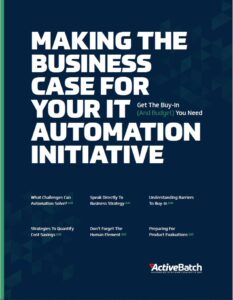What Is Intelligent Process Automation And Why Does It Matter?
Intelligent process automation (IPA) solutions are using artificial intelligence and machine learning to go far beyond RPA and task automation. Find out how.

What Is Intelligent Process Automation?
Intelligent process automation (IPA) empowers organizations, giving them the ability to implement dynamic, flexible operating models. Combining robotic process automation with AI, analytics, OCR/ICR and process mining, intelligent process automation allows businesses to level up their operations.
With the ability to adapt autonomously, intelligent process automation can proactively react to changing market and business conditions. It helps organizations develop and implement new end-to-end processes for business and IT. Using the different benefits of the underlying technologies, IT leaders can automate a wider range of processes — from financial and accounting to business and customer support.
Intelligent Process Automation vs. Robotic Process Automation
Intelligent process automation is often regarded as being the same as robotic process automation (RPA). This is only half true. While robotic process automation is often a key capability of IPA platforms, IPA does not necessarily have to include RPA.
Robotic process automation refers to tools -applications, platforms, or scripts- that automate simple, rule-based, repetitive tasks. These tasks are often time-consuming when done manually. For example, instead of collecting phone numbers from applications, an RPA tool can be trained to automate the task.
However, the problem with RPA tools is that they are rigid because they are rule-based. If the company updates its form, or a customer enters information into the wrong row, the RPA tool won’t be able to successfully complete the task.
This is where intelligent process automation is frequently used –at the point where RPA is no longer effective. By leveraging artificial intelligence, an IPA tool can complete more complex processes that incorporate a variety of new and emerging technologies.
Artificial Intelligence And Machine Learning For IPA
The use of AI and ML in intelligent process automation enables IPA platforms to go far beyond the front-office and back-office tasks RPA is used to automate.
Artificial intelligence, for example, makes it possible for IPA platforms to analyze both semi-structured data and unstructured data necessary for natural language processing (NLP), intent detection, and other cognitive technologies. This allows users to build complex workflows for chatbots, or responding to customer requests.
So whereas RPA tools are used to automate tasks that already exist, IPA tools give users the opportunity to re-imagine existing processes, or to optimize those processes with deep learning, or use new technologies such as intelligent decision making to create innovative new processes.
IPA platforms also leverage machine learning algorithms that analyze historical and real-time data in order to optimize processes both in real time and in the future. For example, by automatically routing workflows based on their predicted runtimes, log contents, or flow control to auto-remedy problem workflows. However, designing and optimizing processes is still only part of the IPA picture.
Get the buy-in and budget you need for your IT automation initiative
Read five strategies that will help you build a business case for your IT automation goals.
Extensible Intelligence For End-To-End Orchestration
In today’s IT and business environments, no platform exists as an island (at least, it shouldn’t) and the same holds true for IPA tools –an IPA tool must access and manipulate data from a variety of sources, many of which rely on disparate technologies and different vendors.
In order to achieve this, a level of extensibility is necessary on the back end, either through a workload automation solution, an enterprise job scheduler, or a service orchestration and automation platform. Such solutions provide the universal connectors and API accessibility needed to seamlessly manage data and dependencies between disparate systems, making truly end-to-end processes possible. With an IPA tool supported by the right data and the right infrastructure, IT teams are able to provide innovative workflows that orchestrate tasks all the way from the data center to the end-user or the customer.
Intelligent Process Automation Examples And Use Cases
IPA tools are used to automate time-consuming, routine business processes, enabling employees to spend more time on cognitive tasks. By freeing-up employee hours, organizations gain efficiency, improve productivity, and save on full-time employees. IPA case studies, therefore, span a variety of industries from finance, to healthcare, to manufacturing.
Financial services: Customer support professionals have to gather customer data from databases, phone calls, email, and online chats. This is time-consuming and can impact the customer journey. An IPA tool can be used to pull data from the database and update records with additional information found in phone calls and emails.
Insurance: A claims department might spend hundreds of hours a year entering data from claims forms into the department’s CRM. An IPA tool can be used to scrape necessary data from the forms and then port the information over to the CRM. This task can be included in a larger end-to-end process that delivers relevant information directly to the customer or end-user.
Shipping: IPA tools can be used to analyze shipping data to optimize shipping routes and schedules in order to reduce bottlenecks, prevent delays, and optimize available resources.
Benefits Of Intelligent Process Automation
The main benefits of process automation are efficiency, optimization, and innovation. By automating routine processes, employees can save time. Machine learning algorithms can discover new ways to optimize processes for further efficiency and productivity gains, and both business and IT users can leverage new technologies to develop innovative solutions and improve the customer experience.
Furthermore, a recent study by McKinsey found that, by implementing IPA, organizations have:
- Automated over 50% of manual tasks
- Reduced process times by 50%
- Achieved ROIs of over 100%
The Future Of Intelligent Process Automation
IPA is to process automation as the internet was to video games –both developments spawned (or are spawning) an array of new possibilities. But both developments rest on other technologies: for gaming, it was high-speed internet and greater processing power, and for automation it is the orchestration of back-end IT processes.
The relationship between IT and business is rapidly changing, with IT becoming increasingly essential to business success, digital transformation initiatives, and customer satisfaction. This is causing IT to align closely with business and end-user needs, orchestrating end-to-end processes that streamline data across IT infrastructure, data centers, and disparate IT and business systems.
As Gartner explains in its 2020 Magic Quadrant for RPA:
“Customers are striving toward an orchestrated, end-to-end, intelligent, event-driven form of automation, delivered with an effective combination of automation tools with multiple machine learning applications and packaged software. Gartner calls this ‘hyperautomation.’”
Ready to see how we make workload automation easy?
Schedule a demo to see how easy it is to build and maintain your jobs in ActiveBatch.
Frequently Asked Questions
Organizations implement intelligent process automation to gain additional functionality and advance their existing automation initiatives. Intelligent process automation takes the static nature of traditional automation and makes it proactive and autonomous — all without the need for human intervention.
An example of intelligent automation would be using machine learning to analyze historical and real-time workload and compute data. An intelligent automation platform could then manage workloads to optimize runtimes and prevent delays, while provisioning and deprovisioning virtual machines to meet real-time demand. What can you do with intelligent automation software?
Yes, ActiveBatch uses machine learning algorithms to analyze historical and real-time data in order to intelligently manage workloads and compute resources, on-premises or in the cloud. ActiveBatch uses artificial intelligence to monitor the health of automation environments and can be used to manage other intelligent automation tools as well. What can you do with intelligent automation software?
Traditional process automation gives organizations the ability to automate business and IT processes but it is all driven by human resources. Any changes that are needed to adjust processes or adapt to new market or business needs must be identified and implemented by IT resources. Intelligent automation uses AI, RPA and other technologies to proactively and autonomously adjust processes – continuously and without the need for human interaction.
Robotic process automation is one of several technologies that are combined to create intelligent process automation. Robotic process automation can be used to automate digital tasks using bots that can learn and execute rules-based processes. Intelligent process automation is a more powerful combination of RPA, AI, process mining and more. It allows organizations to elevate their static automations and create proactive and autonomous processes that react to growing business conditions without the interaction of human resources.








